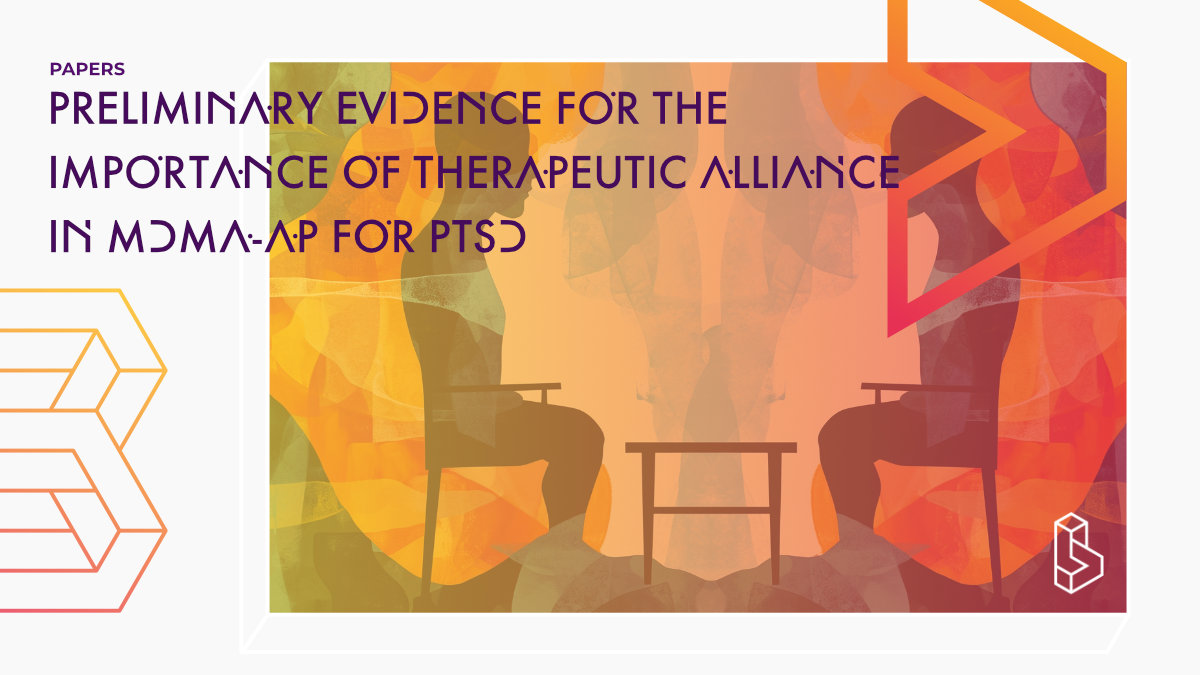This analysis of a clinical trial (n=22) examines the role of therapeutic alliance in MDMA-assisted psychotherapy (MDMA-AP) for treating chronic PTSD. It reports that after controlling for baseline PTSD severity, a strong therapeutic alliance at the mid and late stages of treatment (sessions 4 and 9) significantly predicts lower clinician-assessed and self-reported PTSD severity post-treatment.
Abstract of Preliminary evidence for the importance of therapeutic alliance in MDMA-AT for PTSD
“Background: MDMA-assisted psychotherapy (MDMA-AP) is a combined psychotherapeutic and pharmacologic intervention that shows promise in the treatment of posttraumatic stress disorder (PTSD). Although therapeutic alliance has been established as a key predictor across psychotherapies and is emphasised within MDMA-AP treatment manuals, research has not yet examined the relationship between therapeutic alliance and MDMA-AP treatment outcomes.
Objective: Examine whether therapeutic alliance predicts changes in PTSD symptoms following MDMA-AP.
Method: Twenty-three individuals with chronic PTSD participated in a MDMA-AP clinical trial that included a randomised (MDMA vs. placebo) and open-label phase. The present analyses focused on participants who were administered MDMA over the course of the randomised and open-label phases (n = 22). Therapeutic alliance was assessed using the Working Alliance Inventory at sessions baseline (pre-session 3) and sessions 4 and 9. PTSD symptoms were assessed using the Clinician Administered PTSD Scale and the Impact of Events Scale-Revised.
Results: Controlling for baseline clinician-assessed PTSD severity, therapeutic alliance at sessions 4 and 9 (but not baseline) significantly predicted post-MDMA-AP clinician-assessed PTSD severity. Controlling for baseline self-reported PTSD severity, therapeutic alliance at baseline (although this did not survive correction for multiple comparisons) and sessions 4 and 9 predicted post-MDMA-AP self-reported PTSD severity.
Conclusions: The present results provide the first preliminary evidence for the relationship between the therapeutic alliance and treatment outcomes within MDMA-AP for PTSD. These findings highlight the important role of psychotherapy, and common psychotherapeutic factors, within MDMA-AP. Replication in studies with larger and more diverse clinical samples remain necessary.”
Authors: Richard J. Zeifman, Hannes Kettner, Stephen Ross, Brandon Weiss, Michael C. Mithoefer, Ann T. Mithoefer & Anne C. Wagner
Summary of Preliminary evidence for the importance of therapeutic alliance in MDMA-AT for PTSD
Despite the existence of several evidence-based psychotherapeutic and pharmacological treatments for posttraumatic stress disorder, there remains a need for exploring additional PTSD interventions. MDMA-assisted psychotherapy is a promising novel intervention for PTSD, with several randomised controlled and uncontrolled trials suggesting that MDMA-AP leads to significant reductions in PTSD and depression severity.
Find this paper
https://doi.org/10.1080/20008066.2023.2297536
Open Access | Google Scholar | Backup | 🕊
Cite this paper (APA)
(2024) Preliminary evidence for the importance of therapeutic alliance in MDMA-assisted psychotherapy for posttraumatic stress disorder, European Journal of Psychotraumatology, 15:1, DOI: 10.1080/20008066.2023.2297536
Linked Clinical Trial
A Test of MDMA-Assisted Psychotherapy in People With Posttraumatic Stress DisorderThis randomized, double-blind, placebo-controlled trial (n=23) assessed the safety and effectiveness of MDMA-assisted therapy among people with chronic, treatment-resistant PTSD, including veterans.

